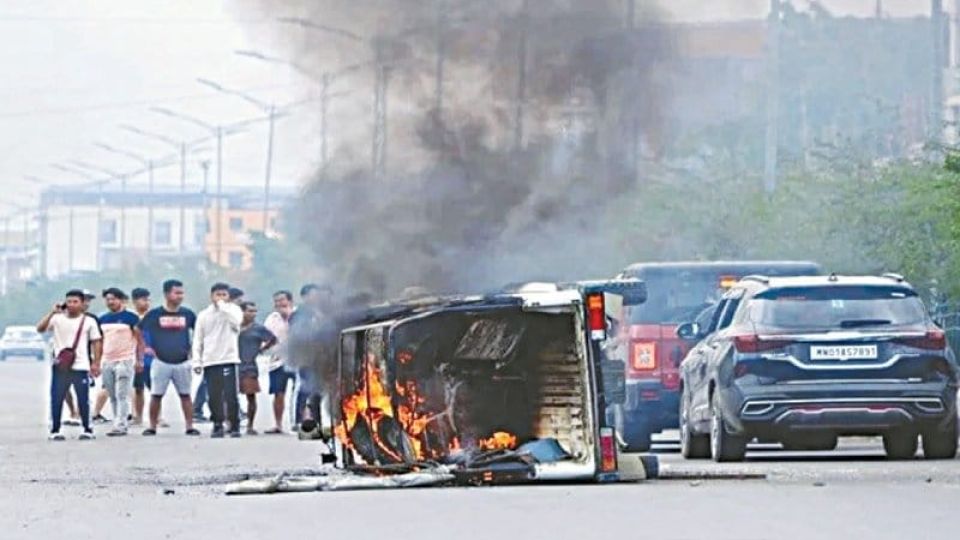May 8, 2023
ISLAMABAD – India’s northeastern Manipur state remained tense on Saturday after clashes broke out between predominantly Hindu Meitei and Christian Kuki groups on Wednesday over moves to accord tribal status to the dominant Meiti group, reports said.
Vehicles, houses, schools, churches and commercial properties were set ablaze by protesting mobs after the Tribal Solidarity March, organised by the All Tribal Students’ Union of Manipur, to protest against the Meitei community’s demand to be included in the list of Scheduled Tribes.
Manipur DGP said the situation in the state improved after the intervention of security forces. As many as 54 people have lost their lives in the violence, officials told Press Trust of India.
A paramilitary commando on leave was shot dead by armed assailants in his village in Manipur’s Churachandpur district on Friday, officials told Press Trust of India. In the wake of constable Chonkholen Haokip being killed, the CRPF directed its personnel hailing from Manipur and on leave in their home state to “immediately” report to their nearest security base with family members.
Churches, schools, houses set ablaze in Manipur
A defence spokesperson said a total of 13,000 people were rescued and shifted to safe shelters.
On Wednesday, violence ensued in the Bishnupur and Churachandpur districts of Manipur leading to destruction of homes, temples and churches that quickly escalated to other districts over the following days.
The Scheduled Tribes Demand Committee of Manipur recommends the parameters to accept or deny tribal status that grants affirmative action. It has said that the Meiteis, who are included in the Other Backward Class category, were excluded from the Scheduled Tribe list without any constitutional safeguards, thereby marginalising them in their ancestral land.
In opposition to their demands for inclusion, the United Naga Council has argued that the inclusion of Meiteis would defeat the purpose of the Scheduled Tribes list, which is to provide protective discrimination for groups that require it.
Manipur comprises 34 recognised Scheduled Tribes, broadly falling under the Naga and Kukichin or Kuki tribal groups. The hills, inhabited by the tribals, amount to around 90 per cent of Manipur’s total area whereas the Imphal valley, where the dominant Meitei community primarily resides, makes up the remaining 10pc of the state’s area. The tribals are largely Christian, while the majority of Meiteis identify as Hindus.
Of the state’s projected population of 3.649 million in 2023 (2.856 million in the 2011 census), of whom about 53pc are Meiteis, an estimated 70pc are settled in the Imphal valley, and the remaining 30pc live in areas that belong to the tribal community.
The majority Meiteis inhabiting 10pc of the state’s landmass, coupled with their inability to buy land in the remaining 90pc of tribal protected hill areas, which is declared as belonging Scheduled Tribes, has contributed to their demands to be included in the list of Scheduled Tribes. But their demand is opposed by the tribal community in the state on account of its apparent dominance in terms of population and political representation, with 40 of the 60 lawmakers in the state assembly belonging to the Meitei community.
The United Naga Council argued that the Meiteis are an advanced community in India.


